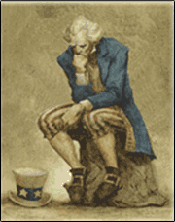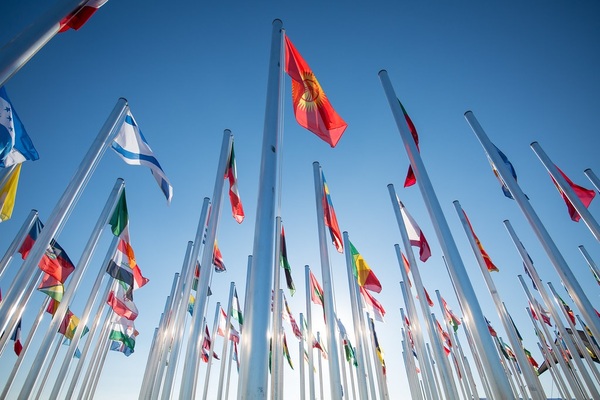
–>
September 30, 2022
At the core of human society is the family. Extend that family to cousins, and you have the tribe or clan. Extend that and you have the nation.
‘); googletag.cmd.push(function () { googletag.display(‘div-gpt-ad-1609268089992-0’); }); }
The Book of Genesis in Chapter 10 is often called the Table of Nations. Whether taken literally or metaphorically, it describes seventy groups of people who would go on to found nations. They were driven from Babel — run by a world dictator, Nimrod — and sent out with separate languages. What is interesting is that they were seen as starting with progenitors, that is to say: families.
The purpose of independent nations, according to the bible, was to limit man’s inclination to evil. If men were united their evil would only increase.
Gen 11:6 And the LORD said, Behold, the people is one, and they have all one language; and this they begin to do: and now nothing will be restrained from them, which they have imagined to do.
‘); googletag.cmd.push(function () { googletag.display(‘div-gpt-ad-1609270365559-0’); }); }
Splitting humanity up would limit the damage. All nations have their faults, but not the same faults, and so the competition keeps the mischief down.
But the key point is that nations are extended families.
Some groups never rose too far about the familial/tribal level. (African peoples for example, and ironically, the Celts. The latter were literate, and familiar with the technology of the day — often inventing it — but preferred the clan structure.) The ancient Greeks didn’t rise above the city level until outside forces compelled a sense of unity.
By the nineteenth century, and chiefly as a result of the French Revolution, the ideal became the nation-state.
The nation-state should contain a people who have a shared language, a shared history, a shared ancestry, a shared religion, and borders which conform to those standards. The state should have one law, agreeable to all, with a central capital. This was the ideal.
There are disagreements as to when this concept was enshrined. Some say it started with the treaty of Westphalia in 1648, but that only stabilized the relations between European empires. Those empires did not conform to the idea of a nation-state, and would later break apart themselves.
‘); googletag.cmd.push(function () { googletag.display(‘div-gpt-ad-1609268078422-0’); }); } if (publir_show_ads) { document.write(“
The French Revolution embedded the concept — France being the first nation to aim for the ideal. Local languages (Occitan, Basque, Breton, and so on) were eventually suppressed in favor of Parisian French. One national set of laws was imposed on the whole country. Everybody was made an equal citizen.
French children were taught that they had a shared history and ancestry, with their school texts beginning… “Our Ancestors the Gauls…” Despite present politically correct dismissals, it was generally true. Most French children of native stocks, even outlier stocks, had at least one Gaulish ancestor. France was generally Christian, usually Catholic, though allowance was made for Protestants and Jews. And the borders of European France generally conformed to the ancient borders of the Gauls.
Nations unified along these lines are hard to destroy. They can be invaded and occupied and still reemerge, even centuries later. Think of Poland or the Greeks. Both were occupied for centuries. What kept them together was a common ancestry, history, language, and religion. The borders might have been modified (Greece no longer controls Constantinople), but the core nation survived, and roughly in the same historical area. Greece reconstituted itself south of the Balkans, not in Scandinavia, while Poland resurrected itself along the Baltic, not South America.
Jews, particularly in Europe (the Ashkenazim), maintained a common religion, a common religious law (Torah), a shared history (the bible), a shared ancestry (intermarriage was frowned on), and a shared religious language (Hebrew, though it was limited to religious use). Yiddish functioned as the shared vernacular among Ashkenazim for non-religious use. The only thing they lacked was their historical land. When modern Zionism arose, they insisted on returning to their historical land, not a substitute.
 To the extent any people maintain these commonalities, they are all but indestructible. The definitions can be adjusted, but not too much. The Greeks and Poles lost their sovereignty for a while, but kept everything else. The Jews lost their land, but kept everything else. The Japanese were under military occupation for seven years, but maintained everything else.
To the extent any people maintain these commonalities, they are all but indestructible. The definitions can be adjusted, but not too much. The Greeks and Poles lost their sovereignty for a while, but kept everything else. The Jews lost their land, but kept everything else. The Japanese were under military occupation for seven years, but maintained everything else.
So the idea of distinct nations and cultures is a force for good.
One cannot mix oil and vinegar. Neither can one mix disparate peoples. Given time, they will separate. Yet, empires attempt to do this, hence they are intrinsically unstable. Probably the worst breakup was the Austro-Hungarian Empire. What a mess.
Yet, that is exactly what liberal one-worlders want. They claim to champion multiculturalism, but in truth see it only as meaningless outer affectations, useful only to divide a people. They champion religious tolerance. In reality, they know that when the religions of any community become too disparate, then the power of religion will disappear altogether, which is what they plan. Where there is little point of unity, outside control becomes easy. Divide and conquer.
When America was overwhelmingly Protestant, there was a generally agreed on set of morality and holidays. When Catholics started arriving in mass numbers in the 19th century, there was a fear that this unity would be upset. However, the adjustments were minor. Both celebrated Sunday as the sabbath, and shared the major holidays. Intermarriage smoothed things over.
The large-scale arrival of Jews after 1880 upset this a bit more, but it was confined chiefly to the New York City area, where there are some local curiosities. New York public school spring breaks tend to co-ordinate with Passover (because a lot of the teachers were Jewish). Everybody in the Metro Area (especially Brooklyn, Rockland County, Nassau County, and Ocean County, NJ) knows that there will be a pulse of heavy rush-hour traffic returning home before sunset starts the Jewish sabbath or holiday. Traffic reports mention it.
Oddly, it was the Jewish community which forced the creation of the two-day weekend.
In 1908, a New England mill became the first American factory to institute the five-day week. It did so to accommodate Jewish workers… – The Atlantic
In this case, the result was good, but it demonstrates that small communities can radically change societies, and that will not always be good. What happens when Muslims demand Friday off?
Europe’s Schengen Area was just a start. After homogenizing Europeans, the goal will be to homogenize the planet. Ultimately, the object is not multicultural tolerance, but to so fracture any society as to make it incapable of resisting one-world directives.
Ironically, Islam has a similar strategy.
…ISIS presents itself as transcending nationalism… saying “let the world know that we are living today in a new era,” rejecting the entire concept of the nation state, and reducing the world into the camps of the ummah (the Muslim community) and its opponents. — Tony Blair Institute (2015)
Both Islam and liberals want to destroy the nation-state, arguably the most stable political structure ever devised. This is the source of the leftist-Islamic alliance; and both use similar strategies.
Both favor unbridled immigration and the destruction of traditional marriages — remember that, at the core, the nation-state is ideally an extended family. The Left destroys the family with LGBTQ agendas. The Muslims destroy non-Muslim families with kidnapping, polygamy, and forced conversions.
Muslim men are encouraged to marry non-Muslim women (by sharia, the children are Muslim), while Muslim women are off limits to infidels. Countries can be demographically shifted by such tactics. It took centuries to shift Egypt from Coptic Christian to Muslim, but it does work. In the modern world, it will not take as long.
Both the Left and Islam target the nation-state, with the ultimate goal of imposing a one-world order, the only difference being the definition of what that one-world order will be. I suspect the Muslims are being used as useful idiots, and haven’t figured out the game yet.
Essentially, the one-worlders want to rebuild the Tower of Babel, and they admit it. They want to set up – or re-set up – a world dictatorship.
The plan to destroy nations must be resisted.
Image: UN Climate Change
<!– if(page_width_onload <= 479) { document.write("
“); googletag.cmd.push(function() { googletag.display(‘div-gpt-ad-1345489840937-4’); }); } –> If you experience technical problems, please write to [email protected]
FOLLOW US ON
<!–
–>
<!– _qoptions={ qacct:”p-9bKF-NgTuSFM6″ }; ![]() –> <!—-> <!– var addthis_share = { email_template: “new_template” } –>
–> <!—-> <!– var addthis_share = { email_template: “new_template” } –>






